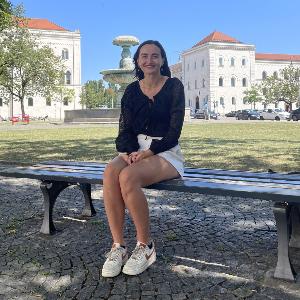Much more than just finance
7 Sept 2022
Economics student Miriam Müller wins a prize for her paper on a mentoring program for refugees.
7 Sept 2022
Economics student Miriam Müller wins a prize for her paper on a mentoring program for refugees.

Economics student Miriam Müller | © LMU
“Social inequality is a waste of potential,” Miriam Müller says emphatically. The 27-year-old is in the sixth semester of her economics course at LMU and has long been interested in sociopolitical issues.
A few weeks ago, she received a message from the office of the Dean: Under the aegis of Good Teaching Day, her seminar paper on Mentoring Refugees: Requirements and Repercussions has won an award as one of 15 outstanding teaching and research projects.
“It came as a huge surprise,” the student recalls. “I knew about the nomination, but I didn’t expect to win a prize.”
The award-winning paper grew out of a seminar. “We were given a free choice of subject matter, and I immediately knew that I wanted to tackle a sociopolitical topic,” Müller says. The student sees economics as about more than ‘just’ finance; and the chance to address societal contexts is one reason why she is studying it.
“I did an apprenticeship at a social research institute before studying economics, so I had already concerned myself with the subject. And when I found out that the data set for a survey of refugees was to be published, that was what I wanted to write about.”
Supported by the Federal Office for Migration and Refugees and run by Start with a Friend, a non-governmental organization, the project brings refugees and volunteers together in a mentoring program. Before mentoring begins, and again upon completion of the program, the refugees are asked to complete a survey to show whether and how it affects their level of satisfaction, their education and their gainful employment.
It was this data that Müller evaluated for her research. “Thanks to my education and involvement in the organization, I was already familiar with the topic. So when the data was published, I found it so exciting that I just had to look into the data set.”
She took an especially close look at the years 2017 and 2018: The data sets were so large that a third year would have been too much to squeeze into a 30-page seminar paper. Her work examined the project’s randomized survey process and also looked at groups that could not be reached.
But in this case, the aim is to enable genuine friendships to take shape – to have someone by your side whom you can trust.Miriam Müller, Bachelor student in Economics
In her research paper, Müller came to the conclusion that effects on the refugees’ level of satisfaction or their knowledge of German could not be found, but that there was an impact on their desire for education. Their fear of being excluded was also attenuated. “The idea behind Start with a Friend is just really nice,” the student says. “In many cases, refugees are assigned someone who merely supports them with official paperwork and the like. But in this case, the aim is to enable genuine friendships to take shape – to have someone by your side whom you can trust.”
This does seem to have a positive effect: According to Müller’s research, the mentoring inspires refugees to invest in their education and recognize how important it is.
Even so, the economics student was surprised by the findings of her work: “I would not have thought that I would be able to arrive at a positive conclusion. I rather assumed that dissatisfaction would be the prevalent sentiment. But the refugees do tend to be more satisfied, even if it is not so easy to measure that. Satisfaction is something very personal. It is subjective. You might be satisfied more easily than I am, which makes it difficult to quantify.”
Migration doesn’t end when you come to Germany. That is when it really begins.Miriam Müller, Bachelor student in Economics
Müller hopes that her research project will have a long-term impact: “My contribution might overcome prejudices or help ensure that more is done for integration.” Because integration, as she knows, is a long process, and a lot must still be done to improve it: “Migration doesn’t end when you come to Germany. That is when it really begins. We mustn’t let parallel societies emerge. So this is the point at which we must find ways that work for integration.”
The student is therefore considering tackling the issue in greater depth: “I could examine the long-term effects in my bachelor’s thesis. To do so, I would have to add in the subsequent data – for example to see whether the refugees’ knowledge of German has improved, or how the mentoring has affected gainful employment in the long run. Since refugees in Germany are often unable to work in the occupations they used to pursue, it is difficult to identify effects in this area. You can’t do that with the templates. Not even the mentoring programs can do anything about that.”
That said, Müller is not yet sure whether she really wants to continue addressing the subject of her seminar paper in her bachelor’s thesis, even though she already has ideas about how she could do so. Right now she faces a dilemma: The researcher in her urges her to look into something completely new. And after her bachelor’s thesis? “My master’s is next up. But before that I need a vacation.”
Maybe she will then have time to gather experience of mentoring at first hand. Up to now, she has been unable to do so. “But,” she notes, “maybe this is a good reminder to me to get started.”